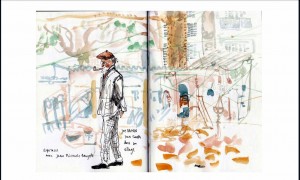In one of the stories in the latest issue of Saraba Magazine (#16), the author goes to movie cinemas because of the opportunity provided by its dark and quiet space to rest hands on his partners’ laps. In another, a writer paints a harrowing picture of solitude expressed best through “writing her bones”, as she puts it; a painful but therapeutic process where every experience is an opportunity for reflection as well as escape, and where artistic output and expression is a solution as much as a problem. In another, a writer describes the haunting experience of a domestic accident with a little child that ends with a quirky and sardonic anti-climax, while another piece recounts, in a series of verses like enchanted incantations of many stories, a journey through a writer’s head during “a decade of madness”. And through the work that populate this edition of the magazine dedicated to the concept of solitude, the reader is taken in a multiplicity of mental directions.
In the poems and accompanying artworks, the editors’ selections show adherence to the widest interpretation of the theme. A disabled on woman on a wheelchair, with sample selections of food recipes all around her (Rosi Martez) portray solitude as much as a middle-aged black man sitting on a distant chair in an otherwise social environment (Moustapha Dime). So does a young man holding an open book, and a pen, pondering what next to write in an inconclusive paragraph, or a gypsy woman with a musical instrument or walking staff. What they have in common, beside their aesthetic appeal that invites the beholder to further exploration of ideas beyond the first contact, is a simplicity that complements everything else in the issue. This is a familiar style for Saraba issues: a minimalist approach that projects brilliance in its modesty and understatement of its internally throbbing energies.
To have put this together as the editors have from across their physical distance from each other is a feat creditable to today’s electronic bridge of solitude: the internet. Dami Ajayi is now a jobless medical doctor in Lagos, while Emmanuel Iduma is on the road with the Invisible Borders roadtrip from Lagos to Sarajevo. Together, they have created a thriving brand and a viable platform for new voices in creative and artistic expression around the continent.
I skimmed the poems, but not all. Even a most perfunctory glance, conditioned by a short attention span, or a recent conditioned apathy to poetry reveals gems in stanzas like this:
To ask a poet about solitude
is to speak about lost moments
and untold stories of life
scribbled on brown sheets, old letters
hanging on the wallAs he plays the piano for his departed lover
in a room where cobwebs hang like portraits on old walls;
where cockroaches exchange dreams with old manuscriptsbeneath the mattress where
a suicide letter lies
waiting to be read:only the words survive
as time carries the burden
of memory like a scarf on a cobra’s head(Gbolahan: 8)
And with that, the feast is complete, deliciously served. Not in the least diminished by sharing, the rest are thus left, best repackaged as it should be, by the selfless re-gifter of all good things. You will take it slow, as I did – to the consternation of my pressuring editors, and enjoy in soluble bites. There’s something for everyone.
The Issue can be downloaded here.


No Comments to On Saraba’s Solitude so far. (RSS Feeds for comments in this post)
No one has commented so far, be the first one to comment!